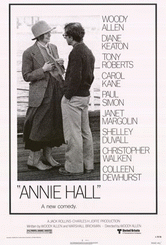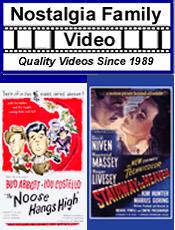Annie Hall - 1977
Production Company: United Artists
Der Stadtneurotiker
Genre: Comedy
Run Time: 93 minutes Tag Line: A Nervous Romance
Film Observations
- "The film that beat Star Wars to the Oscar."
- "An effortless subversion of Tracy and Hepburn"
- "cynicism sunny-side up"
Described often as the birth of modern romantic comedy, Annie Hall swings between hilarity and poignancy, tenderness and cynicism. This nervous romance is one of Woody Allen's most popular films and was a huge success with critics and audiences when it opened in 1977. If anything, Annie Hall's status as a great comedy has continued growing ever since; this summer, the film placed fourth in the American Film Institute's poll of the Top 100 comedies ever made.
Main Cast Noteables
- Woody Allen
- Alvy Singer
- Diane Keaton
- Annie Hall
- Tony Roberts
- Rob
- Carl Kane
- Allison
- Paul Simon
- Tony Lacey
- Shelley Duval
- Pam
- Janet Margolin
- Robin
- Colleen Dewhurst
- Annie's Mom
- Christopher Walken
- Duane Hall
Film Synopsis
Comedian Alvy Singer (Woody Allen) happens to meet Annie Hall (Diane Keaton), a good-looking, insecure midwesterner. Alvy has had two failed marraiges - first to a campus Democrat, then to an ambitious and devoted follower of radical chic. Currently he divides his time between professional appearances, visits to the movies and equally frequent visits to his analyst, where he endeavours to trace the connection between his present neuroses and his deprived childhood in Brooklyn.
It is 1975, Alvy's sixteenth year of analysis. His manager, Rob, introduces him to Annie Hall at a game of doubles tennis. Alvy and Annie fall in love and move in together. Alvy gets Annie to enroll for adult education courses (and also for analysis), and encourages her in her attempt to sing professionally. Worried that she's not intellectual enough for him, Annie takes Alvy's prescriptions for her development as an independent person seriously enough to make him jealous. After a quarrel, Annie moves out, and Rob introduces Alvy to Pam, a humourless Rolling Stone reporter with whom he heroically tries to have fun.
Reconciled with Annie, Alvy takes her on a trip to Hollywood, where they wind up at a party given by Tony Lacey (Paul Simon), a record tycoon who admires Annie's singing. On their flight back, the couple decides that the fun has gone out of their relationship and the two agree to seperate. Annie goes to live for a while with Lacey in Hollywood. The following year, Alvy and Annie meet in New York and discover that they are still friends.
Movie Remarks
Annie Hall is one of the truest, most bittersweet romances on film. In it, Allen plays a thinly disguised version of himself: Alvy Singer, a successful--if neurotic--television comedian living in Manhattan. Annie (the wholesomely luminous Dianne Keaton) is a Midwestern transplant who dabbles in photography and sings in small clubs. When the two meet, the sparks are immediate--if repressed. Alone in her apartment for the first time, Alvy and Annie navigate a minefield of self-conscious "is-this-person-someone-I'd-want-to-get-involved-with" conversation. As they speak, subtitles flash their unspoken thoughts: the likes of "I'm not smart enough for him" and "I sound like a jerk." Despite all their caution, they connect, and we're swept up in the flush of their new romance. Allen's antic sensibility shines here in a series of flashbacks to Alvy's childhood, growing up, quite literally, under a rumbling roller coaster. His boisterous Jewish family's dinner table shares a split screen with the WASP-y Hall's tight-lipped holiday table, one Alvy has joined for the first time. His position as outsider is uncontestable; he looks down the table and sizes up Annie's Grammy Hall as a classic Jew-hater.The relationship arcs, as does Annie's growing desire for independence. It quickly becomes clear that the two are on separate tracks, as what was once endearing becomes annoying. Annie Hall embraces Allen's central themes--his love affair with New York (and hatred of Los Angeles), how impossible relationships are, and his fear of death. But their balance is just right, the chemistry between Allen's worry-wart Alvy and Keaton's gangly, loopy Annie is one of the screen's best pairings. It couldn't be more engaging.
--by Susan Benson of Amazon.Com
Film Trivia & Awards: Annie Hall
Many fans already knew that Annie Hall's working title was "Anhedonia," the inability to feel pleasure. But did you also know....
Allen went all-out creatively for Annie Hall. The movie is remarkable for his use of techniques like split-screens, sub-titles, color schemes, animation and lines spoken directly to the camera. The movie also contains trademarks that he's used in many of his films: cameo appearances, the Allen trademark one-liners, neuroses, cultural referencing and an infectious love of New York.
For star-spotters, there is an early creepy performance from Christopher Walken as Annie's brother. Viewers can catch a quick glimpse of a young Sigourney Weaver and Jeff Goldblum. Singer/songwriter Paul Simon also appears in his first acting role, a born New Yorker ironically cast as an LA producer whose offers of stardom tempt Annie to the West Coast, or "Munchkinland" as Alvy describes it.
Annie Hall was lensed by top cinematographer Gordon Willis (The Godfather: Parts 1,2 and 3 and All the President's Men). The movie was co-scripted by long-time Allen collaborator Marshall Brickman. Annie Hall won four Academy Awards, including Best Picture and Best Director. It also received the New York and National Film Critics awards, the Directors Guild award and four BAFTAs, including Best Picture and Best Editing. As well as outshining Star Wars at the 1977 Oscars, Annie Hall started the fashion trend for thrift-shop chic as a generation copied Diane Keaton's eccentric dress sense.
Here's our list of awards for Annie Hall.
Budget: $4m (USA)








